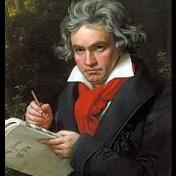Search the Community
Showing results for tags 'mozart'.
-
Hello, as a composition exercise, I tried to reharmonize and orchestrate the famous 3rd movement of the sonata n°11 by Mozart, the rondo alla turca, or Turkish March. Only the upper part of the melody has been kept, and it has been kept unchanged. I tried to propose diverse musical moods. The very first part was intended to be performed by SATB singers but for audio quality reason, I replaced it with a Woodwind quartet (electronic instruments) https://www.youtube.com/embed/26Srn1p3zYw What do you think about the harmony ? EmotiveScores
-
I am currently working on arranging some more Mozart sonatas since unlike Beethoven sonatas that seem to get me overwhelmed, Mozart sonatas never do that. A few people suggested that I shrink the quartet into a trio in my K 545 arrangement to get a more full sound. I didn't though because save for the second movement, where I would have to do some harmonizations, I saw and heard 4 melodic voices, 2 per hand in the sonata. However, I did find a sonata that Mozart wrote 4 years before his K 545 sonata that I figured would be perfect for a trio arrangement, his Piano Sonata in C minor, another well known sonata of his. I noticed that the first movement tends to be where I get the most arrangement mistakes. A few of the triplet passages, I took up an octave to avoid the cellist having to do double duty. The violinist playing eighth notes over a sustained quarter note is one thing, The cellist having to do triplets while sustaining a whole note is a totally different story and is an impossible task. Thus, I took some of the triplet passages up an octave. The triplet passages that I took up an octave all involve a cascade from the violin to the viola before the cello becomes the solo instrument for a while. Except for these triplet passages that involve the instrument cascades, I kept everything in the original octave unless it got too low(which was rare) and then of course I would raise it by an octave to keep it in range. I missed a few slurs here and there, I will fix those in the second draft of the first movement arrangement. In the development section, I tended to have the staccato figure in octaves because it was in octaves everywhere else. Even the Coda still had it in octaves, just scattered a bit. Bars 1-185 are all the bars of the first movement. This is what I want feedback on. Are there any impossible double stops in there? Is there anything I can do about the dynamics to make it sound better? I would love some detailed feedback on what exactly I did wrong so that I can improve the first movement arrangement, and maybe have the entire second movement arranged at the same time(That did happen with K 545, I got feedback on the first movement, I improved the first movement and finished arranging the second movement at the same time). Here is what I have arranged so far of the sonata:
-
For both practicing orchestration and just for fun I made this attempt to orchestrate my favourite piano sonata by Mozart which, I think, is well suited for a symphonic setting: http://www.gerdprengel.de/Mozart_PianoSonata-KV457-1_orch.mp3 http://www.gerdprengel.de/Mozart_PianoSonata-KV457-1_orch.pdf (score) http://www.gerdprengel.de/Mozart_PianoSonata-KV457-2_orch.mp3 http://www.gerdprengel.de/Mozart_PianoSonata-KV457-3_orch.mp3 Gerd
-
I figured that I would start this thread since I am making significant progress with my orchestration of Eine Kleine Nachtmusik. You will notice that most of the notes in any staff are taken directly from the quartet score and put into suitable octaves for the instrument. With this thread, you will be able to see how I have progressed with it because I will post an MP3 and PDF once I finish a section. So far, I have the exposition of the Allegro movement orchestrated. I am working on the development section right now. I have decided on this instrumentation for it: 2 flutes 2 oboes 2 clarinets 2 bassoons 2 horns 2 trumpets Tympani 1st violins 2nd violins Violas Cellos Double basses Here is my first draft of the exposition. How well have I orchestrated it? What issues are there with my orchestration? I vary the instrumentation where Mozart simply repeats the phrase.
-
So, I just got this idea yesterday of orchestrating Eine Kleine Nachtmusik. Should be easier to do than the Pathetique Sonata orchestration I did before. Since it is Mozart that I am orchestrating, I'm staying conservative with my instrumentation. Here is the instrumentation I plan on using for my orchestration: 2 flutes 2 oboes 2 clarinets 2 bassoons 3 horns 2 trumpets tympani 1st violins 2nd violins violas cellos double basses The reason I haven't put in numbers for the string instruments is because most likely, the orchestra will decide on their own what the best strings:other players ratio is or will know it from playing Mozart symphonies hundreds of times. Either way, it isn't like I know the strings:other players ratio for a classical period orchestra(which is what I'm aiming for with my instrumentation if you can't already tell), so I would have no clue on the ideal numbers for the string instruments. There are some spots where I see Mozart writes a phrase and then he repeats the phrase. These would be prime times to bring in more players or have some players take a rest(really depends on the dynamics of the initial phrase and the repeated phrase). And there are some extended creschendo passages as well. Those would be places where I increase the sound density. Extended diminuendo passages, I would do the exact opposite for. I would decrease the sound density. But do you have any suggestions on how to go from string quartet to orchestra? And in particular, what should I do about the triple stops that start the piece? I have been told that double stops, while they sound great in a solo, or even a quartet, when you get to the size of an orchestra, it becomes clunky in sound. The double stops I can simply either have more than 1 instrument group play it or make 1 staff divisi. But I have no idea what to do about the triple stops. If double stops sound clunky in an orchestra, then triple stops will sound even more clunky in an orchestra, so I obviously can't just leave them as triple stops. But what should I do about those triple stops? Here is a PDF of the entire piece as originally written:
-
My third Opus 2 quartet, it's particularly influenced by Haydn in the first and third movements. I wrote this back in September of 2017. I always appreciated feedback, so don't hesitate! Sorry about the trills in the third movement, Musescore's trills are not so good.
- 3 replies
-
- 1
-

-
- string quartet
- mozart
-
(and 2 more)
Tagged with:
-
My second in a set of three string quartets, Op. 2, in the style of roughly the 1780s. Enjoy! Opus 1 has been finished for a while, three piano sonatas, and I will likely post them soon. I also finished the third quartet, but I have not entered it into musescore yet. NOTE: There are two glitches in the first movement, there shouldn't be a D at the end of the exposition, its only a pickup to the development, and the B-flat seventh chord before the recap is a beat too late.
- 2 replies
-
- mozart
- classical style
-
(and 1 more)
Tagged with:
-
A string quartet that I completed on the 16th of June. It is in the classical style, inspired by the quartets of Mozart, Haydn, and Kozeluch (A very underrated composer who was more popular than Mozart during his life).
- 4 replies
-
- classical
- classical style
-
(and 4 more)
Tagged with:
-
Hi all, I have (finally) completed my Quartet for Piano and Winds. I have completed the first and second movement in August, but I was not able to compose a third movement, until last week. When I listened to Mozart's Quintet for Piano and Winds, K.452. I decided to compose a Quartet, which could be played by my friends and me. This is the reason why it is written for Bb Clarinet, Alto Saxophone, F Horn and Piano. I have tried to compose the third movement in the same style as the other two movements. Feedback and sharing your opinions would make me very happy! Enjoy! Kind regards, Maarten Bauer
-
Hi all. Here is the 4th movement of my recently finished sonata in E. It is generally in the style of Beethoven/Mozart. I am quite pleased with how it has progressed. I would value any feedback. I am blessed to be able to share it. The sheet music was written with MuseScore, which is a neat little program. If you wish to listen, simply go follow the link and hit play. Cheers. https://musescore.com/user/9350326/scores/2120656 Because it is being played off the score, it will lack a little of the human touch, but it will give a pretty good idea of the overall sound of the movement. :)
- 4 replies
-
- 4th movement
- sonata
- (and 6 more)
-
I have read the works of Fux and Rameau, I am interested in writing music in the style of the baroque and the classical. Before I practice their teachings I have some questions: Apparently Bach, Mozart, Beethoven and Brahms ALL studied along the lines of Fux, and disagreed with much of Rameau's teachings. Again, considering that I am ONLY interested in writing music in the style of the baroque and the classical, should I abandon Rameau and stick only to Fux? I asked this question a month ago, but did not give as much information. Thanks.
-
I am in the middle of composing my first keyboard sonata. It is in a classical era style, as I imagine all my other pieces will be. Here in the past, I was given note of Classical Form by William Caplin, which focuses on the form and functions exclusively of Haydn, Mozart, and Beethoven. However, I don't want to be limited to only those three composers when I study classical era styles. It would be just like people wanting to compose in a baroque style being limited to compositions of Bach, Handel, and Vivaldi; or those wanting to compose in a romantic style being limited to compositions of Chopin, Schumann, and Brahms. And besides, I have a problem with Beethoven. You see, I consider his middle and late works to be far more a part of the romantic style and era than that of the classical style and era. CPE Bach, Gluck, Soler, and even Scarlatti were truer to a classical style than Beethoven ever was, and Beethoven was as true to romanticism (especially in his middle and late works) as was Schubert, Mendelssohn, Schumann, and Brahms. You know, I think the best way to learn to compose in a classical style (in my case) is to get some hands-on experience with sheet music of composers that came from the classical era. And I'll bet my life savings that those composers didn't need to study all that mathematical crap to create works of their own. They, like JS Bach of the baroque era, were largely self-taught and learned to compose from reading previous musical works, listening to them, and using their own imagination. I prefer looking at sheet music, but finding classical sheet music online for free I find hard to find. Currently, I am trying to compose the second movement to my first sonata. I will need sheet music for the following works to help me: CPE Bach's Keyboard Concerto in C minor, H. 448 Wq. 37 Christoph Willibald Gluck's ballet Alessandro In the meantime, have a look at the first movement of my sonata in PDF and MIDI format. As a side note, the 96th keyboard sonata of Antonio Soler (1729-1783) sounds like an early frigging Mozart! Only Spanish, though. Keyboard Sonata in C minor, I.pdf Keyboard Sonata in C minor, I.mid
- 7 replies
-
- classical era
- cpe bach
- (and 4 more)
-
Hello chums. My name is Marcus. I am largely a self-taught amateur composer. I have observed techniques used by composers of the Classical period such as C.P.E. Bach, Haydn, and Mozart, and I have incorporated such into a composition of my own. The piece I intend to complete is a keyboard sonata in C minor, and I have the last several measures of the piece attached to this topic in PDF and MIDI format as a fragment. Feel free to observe and listen to this fragmentary composition. Do any of you people know of any methods that could help one master a style period like the Classical? I was thinking along the lines of a specific kind composition help book, but if any of you can think of something more effective in what I'm looking for, that would be great. Fragment.pdf Fragment.mid
- 9 replies
-
- classical era
- keyboard
-
(and 3 more)
Tagged with:
-
here is a blog post. it is about mozart. specifically, it is about mozart's 8th sonata for the fortepiano. if you would like to to read it, please do. or not. that would be ok, too. http://music-and-prittee-girls.blogspot.com/2012/06/mozart.html
-
Hi! I don't normally speak to you composer types, I'm more of a rocker girl :3 hence my name (I heard there aren't a lot of girls who compose) I love led zeppelin and I have been inspired by the great guitar works of eddie van halen (would you call that a composition?) which has lead me to musical exploration and the desire to create my own great symphonies like mozart Behtoven and Bach. I have always loved that one song Moonlight Sonata by Behtoven but never really listened to any classical type stuff until recently my band nerd friend Tyler showed me the lovely calming peacful music of Mozart and it pequed my interests so I started listening to more Behtoven and Mozart and that german guy bach. (I love germans anyone here listen to rammstein?? ^_^) ANYWAYS I would like to explore this beautiful new peaceful world of music. I hope to one day compose my own dark symphonic metal pieces and I need your help. I can sing like tarja from Nightwish and I know how to play some piano but I can only read tabs. Where should i start? If someone would be willing to help me learn musical notes one on one (preferably someone who likes nightwish and emilie autumn) i will work my hardest to make sure they are appreciated and youd get into all my bands future concerts for free. ;P Anyways could you guys also please rec me some more classical music to listen to? Ive been listening to it every night before i go to sleep and its just so beautiful and calming and romantic.>.< any violinists here btw?
-
I was just on YouTube browsing some performances of Mozart operas when I came across a film version of Die Zauberflöte made in 2006. This weird production seems to be set in trench warefare in WWI which is definitely the most obvious place to set a light-hearted singspiel about love, honesty and courage! In act 1 probably the most striking part is when The Queen of the Night appears to sing her recitive and aria, ON A TANK!!!! I mean, what is the world coming to??? http://www.youtube.com/watch?v=Tq0H2zeroz0&feature Later in the film (act 1 finale) you can see how blatantly obvious it is that the director wanted this film to be as politically correct as possible by having a chorus of workers made up of both men and women from pretty much every country imaginable, getting rid of any signs of racism and sexism. But is saying this, the character of Monostatos isn't even meant to look like someone with an African background at all. I'm not saying that we are meant to be sexist and racist, but has political correctness gone too far?
- 9 replies
-
- mozart
- magic flute
-
(and 2 more)
Tagged with:
-
A RULE! In composition. http://petrucci.mus....926-moz-485.pdf Check it out, bars 131 and 132 Top part: E B G B. Bottom part: G B. G, B. IN 2 voices, in similar motion, in octaves! Just thought that was...interesting. Heckel
- 8 replies
-
- mozart
- rule breaker
-
(and 1 more)
Tagged with:





